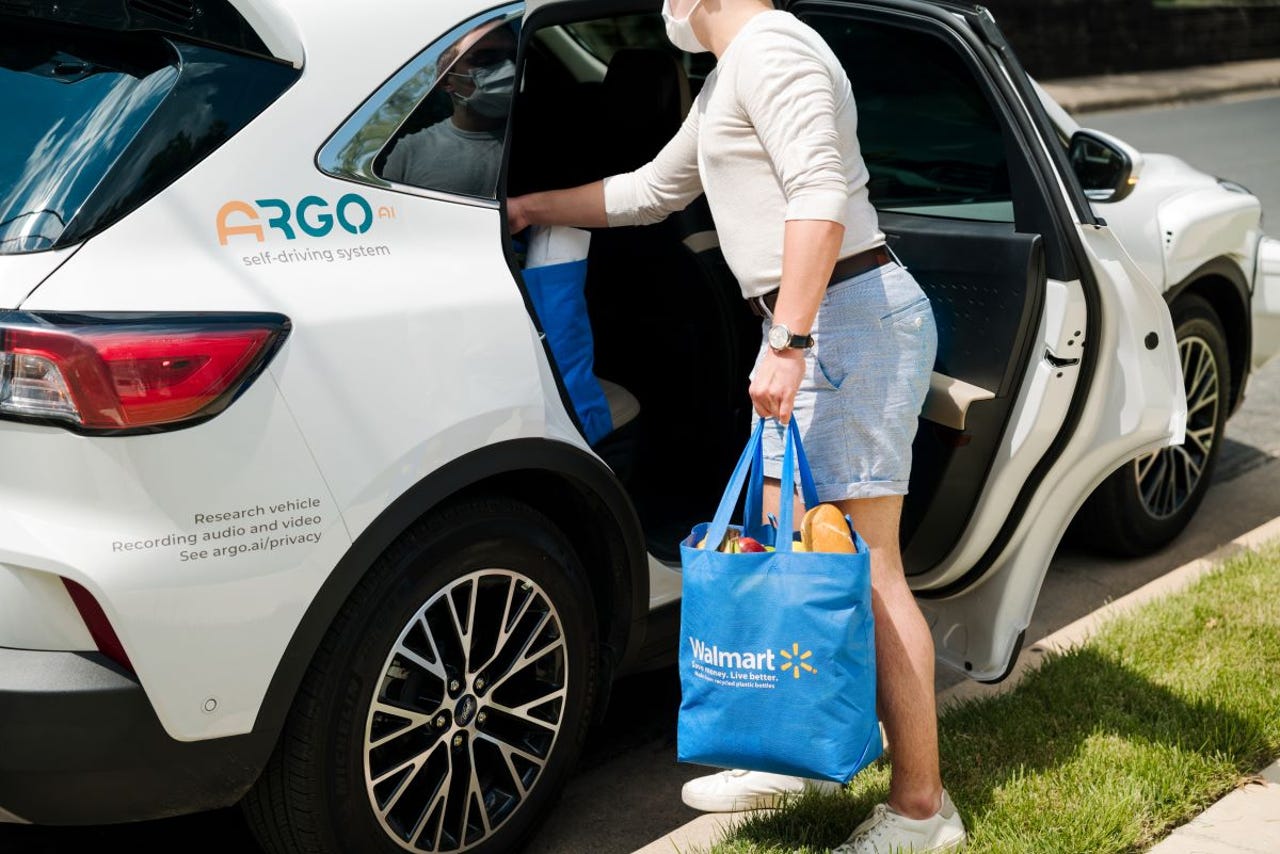Ford and Walmart will deliver your groceries from these self-driving cars


Walmart has partnered with carmaker Ford and autonomous vehicle platform company Argo AI to launch the new service.
Retail giant Walmart is bringing driverless delivery services to new cities across the US. In Miami, Austin and Washington DC, residents can soon expect to see autonomous cars driving themselves directly to customers' houses, filled with pre-ordered Walmart groceries.
The retailer has partnered with carmaker Ford and autonomous vehicle platform company Argo AI to launch the new service. Ford's self-driving test vehicles, equipped with Argo AI's self-driving system, will be delivering Walmart orders to customers.
Innovation
Users within the defined service areas of the three cities will have access to the service. They will be able to place orders of groceries online for door-to-door autonomous delivery. The trial is expected to begin later this year and will expand to new locations over time.
SEE: Digital transformation: Five ways to help your business boost customer experience
Argo AI builds software, hardware, maps and cloud-support infrastructure that powers self-driving vehicles, which can be integrated with third parties' business operations. In this case, the company's technology will integrate with Walmart's online ordering platform to route orders and schedule package deliveries to customers' homes.
Ford has been testing self-driving vehicles in various US cities together with the Argo AI for some years.
For instance, a few months ago, the two companies partnered with ride-hailing app Lyft to introduce driverless cars as part of the app's services. Lyft will deploy Argo AI-equipped cars manufactured by Ford in Miami later this year and in Austin in 2022. Ultimately, Lyft is hoping to have at least 1,000 autonomous vehicles running on its network.
Ford and Argo AI, therefore, are heavily invested in establishing the bases of a large-scale network of autonomous vehicles, which also includes logistics such as fueling, servicing and cleaning.
"Argo and Ford are aggressively preparing for large-scale autonomous vehicle operations across a broad footprint of U.S. cities," said Scott Griffith, CEO at Ford autonomous vehicles and mobility businesses. "Pairing Walmart's retail and e-commerce leadership with Argo and Ford's self-driving operations across these multiple cities marks a significant step toward scaling a commercial goods delivery service that will ultimately power first-to-scale business efficiencies and enable a great consumer experience."
Walmart previously trialed the autonomous delivery of groceries in Miami with Ford in 2018 and has also partnered with General Motors to pilot self-driving delivery services in Arizona.
The retailer stressed that consumer expectations are changing, with next-day or same-day delivery becoming an established norm. To compete, businesses have to invest in innovative technologies that can improve customer experience.
"This collaboration will further our mission to get products to the homes of our customers with unparalleled speed and ease, and in turn, will continue to pave the way for autonomous delivery," said Tom Ward, senior vice president of last-mile delivery at Walmart US.
SEE: Innovation is hard. Here are five ways to make it easier
This is especially important in the face of competition. Amazon's aggressive delivery timelines are challenging to compete against. The e-tailer has also launched its own autonomous delivery project, named Amazon Scout, to deliver groceries with all-electric devices the size of a small cooler.
Ocado is another online retailer that is growing at a fast pace. The company recently announced that it was investing £10 million ($14 million) in Oxford-based startup Oxbotica, which develops autonomy software for vehicles, with the objective of testing different ways of integrating the technology with Ocado's business model.